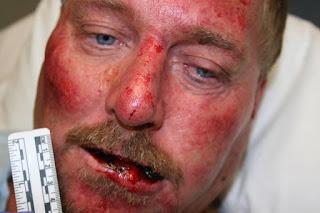
Robert Bryant, after beating by Alabama deputies
(from al.com)
A federal indictment charges Deputy Justin Watson with five criminal courts, including two for deprivation of rights under color of law (18 U.S. Code 242) related to an unlawful traffic stop of Robert Bryant and the beating that followed. Watson faces one count of lying about the incident under oath and two counts of intimidating witnesses, including aiming an unloaded gun at a fellow deputy and pulling the trigger.
The Bryant beating came to light after the murder of Jason Klonowski, who found lawyers and helped pay for Bryant's legal bills. Klonowski also paid for signs and T-shirts to support Bryant and raise questions about the Madison County Sheriff's Office. Klonowski said at a public event in late September 2013 that he would not stop until at least two officers, Watson and Jake Church, were in prison. Less than one month later, Klonowski was found dead on his property, with three bullet wounds to the back of his head. The murder case remains under investigation.
Bryant's beating hits close to home here at Legal Schnauzer for a number of reasons. For one, it started with a traffic stop, for an alleged improper lane change, which federal authorities now state in the indictment was conducted "without probable cause and without reasonable suspicion."
My wife, Carol, and I were subjected to a similar stop in Shelby County. Officer Mike DeHart pulled us over for allegedly rolling through a stop sign, but after giving me a warning and returning my license and insurance documents (indicating the traffic stop, by law, was over), he unlawfully extended the stop by handing me court papers in a defamation lawsuit brought by Republican political operative/lawyer Rob Riley and lobbyist Liberty Duke. DeHart's actions violated a long line of Fourth Amendment case law, most recently spelled out in a U.S. Supreme Court case styled Rodriguez v. United States.
DeHart's actions are particularly egregious because he clearly stopped me to "serve" papers in the Riley/Duke lawsuit, meaning he had no probable cause to make the stop based on a rolling-stop violation that never happened. Also, we now know, thanks to a letter from Birmingham attorney David Gespass, that no summons had been issued in the case at the time of DeHart's bogus stop. That means the court had no authority to hear the case, and DeHart's actions were completely outside judicial boundaries.
The Bryant case also hits home because I, too, wound up being beaten by an Alabama deputy. I wasn't bloodied and beaten with a baton, as Bryant was. But Deputy Chris Blevins knocked me to the concrete floor of my own garage three times and doused me with pepper spray before hauling me to jail for a five-month stay--all from a civil case, based on a preliminary injunction that violates more than 200 years of First Amendment law, apparently without a warrant and without service of a summons in the case.
We also have seen evidence that DeHart and Blevins, like Watson, lied under oath about their actions.
Justin Watson's bogus traffic stop and brutal beating of Robert Bryant is unconscionable. But I would argue that the actions of DeHart and Blevins against me are in the same ballpark. Which is worse, to be bloodied by the side of the road and sent to a hospital, or to be beaten in your own home, sprayed with mace, and sent to jail for five months? We see no reason to arrive at an answer to that question--after all, it's like comparing an airplane crash to a train wreck. Both are horrific.
Here is one major difference between the Bryant beating and my case: We see some signs that justice might be done in the Bryant case. And ironically, it largely is being sought for the criminal "deprivation of rights under color of law," a subject we addressed here about six weeks ago.
We see no signs of justice, so far, in my case. Is that because a lawyer (Rob Riley) orchestrated the whole charade and another lawyer (Judge Claud Neilson) served as Riley's personal rubber stamp? Are federal authorities less likely to pursue a case where members of the legal tribe are at the heart of wrongdoing?
My answer to those questions is a resounding yes. That doesn't mean, however, that Carol and I will be denied justice. But it might take longer than it should, and we might have to consider remedies outside a court system that has consistently cheated us for 15 years.
